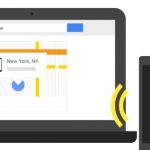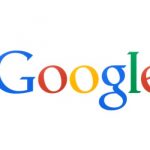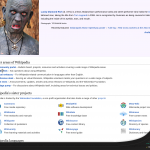Cyanogen will bundle Microsoft apps with its Android ROM

Future Android-based builds and ROMs from Cyanogen Inc will ship with bundled Microsoft apps, as the startup has signed a deal with the Redmond, Wash.-based software giant. The partnership will result in Microsoft apps and services such as Bing, Skype, OneDrive, OneNote, Outlook, as well as productivity suite Office among others being prominently showcased on Cyanogen’s software.
The collaboration between the two companies doesn’t come as a surprise as many similar rumors started to crop up when a news outlet reported that Microsoft was making an investment in Cyanogen Inc. The partnership is a win-win situation for both of the companies.
Lost your phone? Just Google it

Becoming reunited with your lost phone just got a whole lot easier. It doesn’t matter if you're alone and don't have access to another phone to ring your cell to see if it has slipped down the back of the sofa. To make life a little easier, Google is rolling out a feature that enables you to conduct a Google search for your phone.
Whether you have mislaid it in the house, or somewhere further afield, Google will help you to track down your beloved handset. You just need to make sure that your phone is updated with the latest version of the Google app and you're ready to go phone hunting. It's a bit like an extension of the feature found in Android Wear, so how does it work?
Google hits back at European antitrust charges

Google abused its position in Europe to further its own online products, says the European Commission. Following a five-year investigation, Google stands accused of abusing dominance in Europe, violating antitrust laws. EU competition commissioner Margrethe Vestager says that Google gave its own shopping comparison service greater priority over rivals in search results.
The company's mobile operating system is also in the firing line. Android, it is said, has been used by Google to promote its own products and services over those of rivals.The Commission is also launching a formal investigation into Android to determine whether Google acted anti-competitively with its mobile operating system. Attention is focused on Google's bundling of its own apps after forming agreements with hardware manufacturers. Unsurprisingly, Google disagrees.
Android users download Mozilla Firefox 100 million times (and counting) from Google Play

Firefox is important to me and I hope it is important to you. Even if you do not use the browser, there is value in having an open source browser available that isn't based on WebKit or a fork of it (Blink), as so many are nowadays. Variety is the spice of life, and having only one browser engine is not only sad, but dangerous; competition drives innovation.
If you are an Android user, you probably use Chrome or the stock Android browser and that is OK; both of those browsers are great. With that said, some people, such as myself, prefer Mozilla's Firefox. It is fast, buttery smooth and offers plugins. Today, Mozilla announces that Firefox for Android has been downloaded 100 million times. Whoa.
Ad-free version of YouTube on the way -- for a price

Google is on the verge of launching an ad-free option for YouTube users. An email sent out to 'YouTube Partners' (or content creators) reveals that the company has plans to unveil a paid-for version of the video service that enables viewers to avoid the irritation of ads.
For content creators, YouTube says the plans offer a new way to pull in the cash: "we'll generate a new source of revenue that will supplement your fast growing advertising revenue". While there is yet to be an official public announcement, the news comes just days after Google came in for criticism for showing "unfair and deceptive" ads in its YouTube Kids app.
Google needs to streamline its TV product line

Initially, Google’s new Chromebit add-on appears hugely impressive. The HDMI dongle simply plugs into the back of your TV and provides you with a fully-fledged Chrome OS computer for less than $100.
However, when you line up Chromebit next to the search engine giant’s other products, it looks like another piece in an increasingly confused jigsaw puzzle. Google’s product line-up includes Android TV, Chromecast, the Nexus Player and now Chromebit.
Google is too slow at clearing crap from the Chrome extension store

Malware is something computer users -- and even mobile and tablet owners -- are now more aware of than ever. That said, many people do not give a second thought to installing a browser extension to add new features to their most frequently used application. Despite the increased awareness, malware is not something a lot of web users think of in relation to extensions; but they should.
Since the beginning of 2015 -- just over three months -- Google has already received over 100,000 complaints from Chrome users about "ad injectors" hidden in extensions. Security researchers have also discovered that a popular extension -- Webpage Screenshot -- includes code that could be used to send browsing history back to a remote server. Google is taking steps to clean up the extension store to try to prevent things like this from happening, but security still needs to be tightened up.
Before our buying polls close, please answer: Will you buy Apple Watch or Chromebook Pixel?

If you haven't responded to either of our most-recent buying polls—Apple Watch and Chromebook Pixel—it's not too late. Preorders for the timepiece start April 10. The laptop is available now, but with long-wait ship times. I purchased the higher-end Pixel, which review is underway. Whether or not one of our writers will test the smartwatch is uncertain.
Polls of this nature are meant to gauge what a specific audience, BetaNews readers, plan to do. Often what respondents would like to buy isn't what they do. For lots of reasons: Budget; spousal or partner objections; availability; competitive pricing; early product reviews; and more. Results better reflect your intentions as the sample size increases. So, please, take a few seconds to answer each poll, if you haven't already.
Google reported to FTC for 'unfair and deceptive' ads in YouTube Kids

A number of consumer groups have filed a complaint with the FTC suggesting that Google is targeting children with "unfair and deceptive" ads in YouTube Kids for Android and iOS. A letter signed by Children Now, Consumer Watchdog, Campaign for a Commercial Free Childhood, and others says that ads are displayed in a way that would not be permitted on broadcast or cable television.
The letter makes three main complaints about the app. The first suggests that Google mixes programming and ads, while another says that the relationship between Google and the manufacturers of advertised products is not clear. The groups ask for the FTC to take action to stop the advertisements.
Turkey blocks Facebook, YouTube and Twitter; Zuckerberg caves in, Google fights back

Today Turkey blocked access to a number of websites including YouTube and Twitter. The ban came after the sites published images of a prosecutor being taken hostage at a court in Istanbul earlier in the week. Google has vowed to getting things back up and running, but it's not the same story for everyone.
While a block was also put in place on Facebook, the social network sidestepped the ban by agreeing to comply with a court ruling. This is not the first time Mark Zuckerberg's site has bowed to pressure from Turkey. At the beginning of the year, despite previous claims to stand up for free speech, Facebook bowed to pressure to block pages that insulted or offended the Prophet Mohammad. Now it looks as though history is repeating itself.
Google will continue to dominate search ad market in 2015

Google is looking at another dominant year in the search ad market, with estimated spending to reach $81.59 billion in 2015 according to research firm eMarketer.
Holding a solid 54.7 percent of the search ad market in 2014, Google will drop 0.2 percent of the total search ad revenue. This does not mean a decrease in revenue though, going from $38.42 billion to $44.46 billion in one year.
Android malware drops, but there are still nearly 10 million affected devices

Google says that it is keen for Android to be a secure platform for developers and end users alike. It's not a unique claim; Apple would likely say much the same about iOS, and Microsoft about Windows Phone/Windows 10 for Phones.
To demonstrate how fervently it has been working away at improving security and introducing new security-focused features, Google today published a report looking back on Android security in 2014. Dubbed the Android Security State of the Union 2014, it makes for interesting reading. It includes the revelation that nearly 10 million Android devices have potentially harmful apps installed.
Google bans Chinese security certificates

Google no longer recognizes security certificates issued by CNNIC, China's domain name registry. The news comes after unauthorized certificates were issued for Google domains, and at the time Google said that CNNIC contractor MCS Holdings had issued the certificates.
What was worrying was the fact that MCS Holdings installed private security keys in a man-in-the-middle proxy rather than keeping them secure. MCS said that human error was to blame, but Google is taking no chances. The search giant is, for now at least, no longer recognizing certificates from the agency.
Chromebook self-browsing is for REAL

Google got me. Not because I didn't get the joke but for how far it actually goes. Perhaps you saw the April 1st post, "Re-rethinking computing", which introduces the project from a "rogue team of engineers...Today, we’re excited to announce a way to make your Chromebook self-browsing". Of course, it's an April Fools gag.
I first saw the post on my Nexus 9 tablet while exercising on the stationary bike. Later, thinking to post a quickie to Google+, I pulled up the URL from synced History on Chromebook Pixel LS. On the N9, I had clicked the post's last link, which did nothing special but when opened on the Pixel took me to the Chrome Web Store with option to install the self-browsing extension. Now that was unexpected. What to do, what to do?
More Android apps coming to Chromebook as Google opens ARC program to all developers

Last year Google introduced support for Android apps on its Chromebook lineup. Since the announcement, we have seen several popular apps arrive at the Chrome Web Store, including Duolingo, Vine, and Flipboard, but the number of such ported apps has been pretty low so far. In an effort to lure in more uber-apps like VLC and others to Chrome OS, the company announces at an event, that it is opening the ARC program -- previously only accessible to select firms -- to all developers. The move will foster the growth of apps at the Chrome Web Store.
The Mountain View-based technology company last year at its developer conference I/O introduced support for Android apps on Chrome OS-powered laptops. The company had showcased a native client extension called “App Runtime for Chrome (ARC)” that runs Android apps on a Chrome OS-powered notebook almost natively through a sandboxed Dalvik VM.
Recent Headlines
BetaNews, your source for breaking tech news, reviews, and in-depth reporting since 1998.
© 1998-2025 BetaNews, Inc. All Rights Reserved. About Us - Privacy Policy - Cookie Policy - Sitemap.